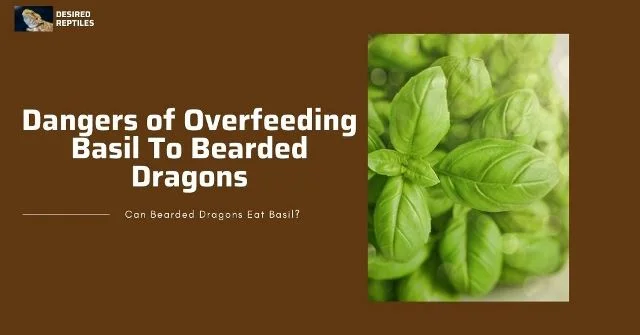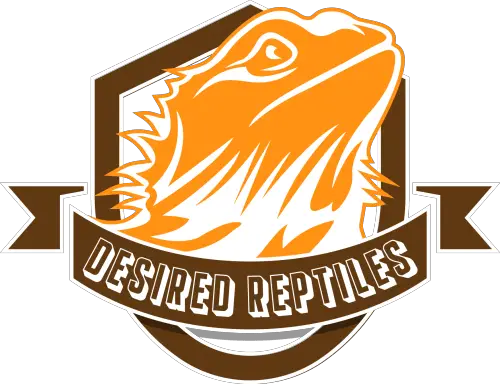Bearded dragons get the majority of their required minerals and vitamins from eating vegetables, which is why plants are crucial in their diet. So, it’s natural to wonder whether your beardie can munch on some of the veggies or herbs you eat regularly. Since they can eat some plants we consume, what about basil? Are herbs safe for your pet?
Bearded dragons can eat basil in moderation. Though the herb is safe for their consumption, it is neither hydrating nor nutritious enough to be a staple food item. Instead, basil can serve as a delicious topping for your pet’s salad.
In this article, we’ll discuss the benefits and risks of feeding your bearded dragon basil, and how best to give it to your pet.

Is Basil Any Good for Bearded Dragons? Benefits of Basil
To determine whether a plant is safe for your bearded dragon to consume, you must first consider the amount of “anti-beardie” substances like oxalic acid and phosphorus it contains. While they may be good for you, they can be detrimental to your pet in certain amounts.
Safe Oxalate Content
Oxalates are compounds found in vegetables that can easily bind with calcium to form salts. These substances are harmful to bearded dragons as they can hinder calcium absorption, which is vital for their bone health and growth. Ideally, the oxalate content in their diet should be below 30mg/100g, maintaining a calcium-to-oxalate ratio of 2:1. Fortunately in basil, the ratio is at 5:1 (15 – 20mg/100g) making it compatible with your pet’s metabolism.
Good Phosphorus-Calcium Ratio
Just like oxalates, phosphorus can bind with calcium, limiting the amount your bearded dragon can absorb. This is why it’s crucial to maintain a 2:1 calcium-to-phosphorus ratio in its diet to reduce the chances of calcium binding and protect your pet from bone diseases such as MBD. Basil maintains a ratio of 3:1 which is great for your pet’s calcium load.
Basil is Nutritious
Bearded dragons require highly nutritious meals to grow properly. So, even when you offer them treats, it’s important to provide nutritious options that do not compromise their daily nutrient intake. For instance, giving watermelon to a recovering beardie is more dangerous than feeding it basil because the former is less nutritious. Basil is rich in vitamins A, B, C, E, and K which are beneficial for your pet, helping it fight diseases.
Basil Has Anti-inflammatory and Antibacterial Attributes
Basil is rich in essential lipids (oils) that can combat inflammation caused by both bacteria and viruses. For example, when cuts and bruises get infected, substances called eugenol and citronella in the basil can contribute to curbing the inflammation and fighting off bacteria effectively, allowing a faster and safer recovery.
Basil Contains Antioxidants
Antioxidants help to protect your pet from radioactive substances. They assist in preventing skin and organ deterioration and stabilizing vitality in old age. They are found mainly in vegetables like carrots and eggplants, but also in herbs like basil.
How to Feed Your Bearded Dragon Basil Properly
You can offer your beardie basil in a salad or as a snack, however, it’s important to wash it thoroughly to ensure there are no insect eggs or traces of herbicides, pesticides, or fertilizers as these can lead to a parasite infestation or severe stomach problems. After washing, cut the basil into smaller pieces so that your pet can eat and digest it more easily.
How Many Basil Leaves Should My Beardie Eat?
Feed your bearded dragon no more than four basil leaves, or ensure it makes up only 30% of its salad. If you’re giving only basil as a snack, make sure it does not compromise its daily nutrition to maintain its daily supply of nutrients. Do not substitute your bearded dragon’s staple greens with basil as it’s not a healthy replacement!
How Frequently Should My Beardie Eat Basil?
Basil can be fed to your bearded dragon weekly. Keep in mind that its daily salad should contain all the essential nutrients it needs. If you’ve read my article on what vegetables bearded dragons can eat, you’d easily understand what your pet needs according to its age. Hence, treats like basil should be offered rarely, especially if your dragon has other delights on its menu.
Are Dried Basil Leaves Safe for Bearded Dragons?
Dried basil or basil powder is not safe for beardies to consume. It’s much more difficult for them to digest and can cause impaction or choking hazards. Always ensure you feed your bearded dragon fresh basil only.

Why is Basil a Treat and Not a Staple Dietary Plant? The Complications
Basil leaves contain high levels of vitamin A, way too significant for bearded dragons to metabolize efficiently. Unlike vitamin C which is readily excreted with proper hydration, excess vitamin A accumulates in the liver causing complications of various severities. The oils found in basil leaves can lower blood pressure which may cause heart and neurological problems for your beardie.
Ultimately, basil is not nearly as nutritious as your pet’s staple veggies. The standard feeder plant is hydrating and nourishing, providing substantial nutrients consistently. Whereas basil, despite being calcium-sufficient, is still less nutritious, fibrous, and hydrating compared to vegetables like dandelion and mustard greens. Therefore, they are better served as occasional greens instead of daily vegetables.
Alternative Herbs Your Bearded Dragon Can Enjoy
Aside from basil leaves, here are other herbs you can feed your bearded dragon:
- Dandelions
- Rosemary
- Parsley
- Cilantro
- Fennel
Bearded dragons can also enjoy fruity treats, as long as you provide the right types. Always consider which fruits are safe for your pet to consume and follow proper feeding guidelines to prevent illness. For more details, refer to my article on the fruits bearded dragons can eat.
The table below lists safe and dangerous fruit treats for your pet.
| SAFE ZONE FRUITS | DANGER ZONE FRUITS |
|---|---|
| Blackberry | Avocado |
| Blueberry | Lemon |
| Apple | Lime |
| Banana | Rangpur |
| Strawberry | Tangelo |
| Peach | Passion fruit |
| Mango | Calamansi |
| Papaya | Grapefruit |
| Fig | Kiwi |
| Prickly pear | Raspberries |
The Bottom Line
Basil leaves are safe for bearded dragons to eat in moderation. They are highly nutritious and can make a healthy treat if your beardie enjoys them. However, it’s important to understand the risks of feeding too many basil leaves to your pet.
If you suspect that your dragon has eaten too many basil leaves, such as more than 10, rush to your vet immediately to prevent the risk of vitamin A poisoning.
